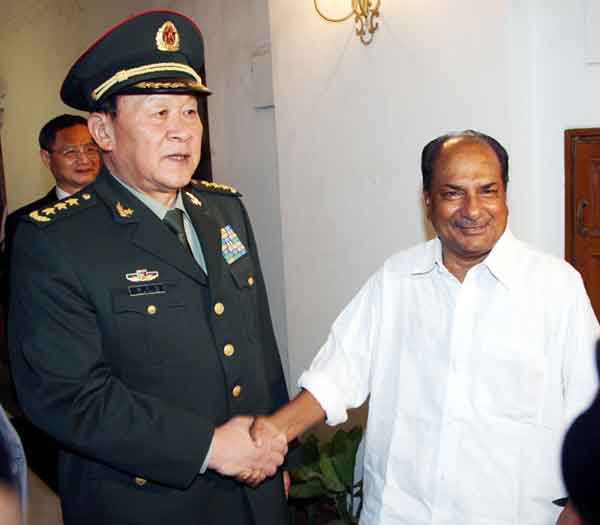IDR Blog
India-China: Wishful thinking by Indians?

The State Councillor and Minister of National Defence of China, General Liang Guanglie meeting the Defence Minister, Shri A. K. Antony, in New Delhi
Our national trait for wishful-thinking often worries me.
A rationally argued assumption is an important part of strategic thinking, a wishful thought with no rational basis is not. I had pointed out in some of my articles in the past how we often confuse wishful-thinking for strategic analysis. Some, if not many of those, who have made a name in our country as strategic analysts, are actually wishful-thinkers. There are many wishful-thinkers even in our security bureaucracy.
Before October 1962, our political leaders had so convinced themselves about the superiority of our Army over the PLA that they thought that all they had to do was to order our Army to thrown out the illegal Chinese posts in our territory…
These observations have been triggered by some E-Mailed comments received by me on my article of September 17, 2012, asking whether our humiliation of 1962 by China can repeat itself. The majority of those who have argued that the question of another 1962 does not arise have given two reasons, both of which appear to me to be nothing but wishful thoughts.
The first is that the Chinese are no longer in a position to spring a trans-Himalayan surprise on us as they did in 1962.The second is that the strong Navy that we have built up since 1962 will act as a deterrent to any more trans-Himalayan adventurism by the PLA. According to them, our Navy is in a position to disrupt Chinese energy supplies across the Indian Ocean and without assured energy supplies the Chinese would not be able to indulge in any adventurism across the Himalayas.
I feel uncomfortable with both these wishful-thoughts. Before October 1962, our political leaders had so convinced themselves about the superiority of our Army over the PLA that they thought that all they had to do was to order our Army to thrown out the illegal Chinese posts in our territory in the North-East and it would do so without any problems. Jawaharlal Nehru and V.K. Krishna Menon, the then Defence Minister, were living in a world of wishful-thinking.
Nehru openly went around saying that he had asked the Army to throw out the Chinese. The Chinese took note of his statements, which proved to have been irresponsible in retrospect, and launched a pre-emptive act of retaliation to neutralise our Army’s capability for throwing out the Chinese posts and inflict a humiliation on our Army.
That kind of wishful-thinking about the relative strengths of the two Armies and Air Forces is fortunately not there now. We take each other’s trans-Himalayan capabilities with a lot of realism. Realistic thinking and analysis is the foundation of good strategic thinking.
The Chinese are realistic geostrategic thinkers and planners. They know energy adequacy could turn out to be their weak point in any future military confrontation with any external power.
But I notice a new wishful thought clouding our strategic thinking presently and that is about the perceived superiority of our Navy over the Chinese Navy in the Indian Ocean area. I am confident that the Chinese Navy will not be able to disrupt our energy supplies across the Indian Ocean , but I do not share the confidence of those who have commented on my article that our Navy would be able to disrupt Chinese energy supplies and that the realisation of this will deter any trans-Himalayan adventure by the Chinese.
The Chinese are realistic geostrategic thinkers and planners. They know energy adequacy could turn out to be their weak point in any future military confrontation with any external power. They have been trying to build up their strategic reserves, diversifying their sources of supply and means of having the supplies reached to them. Their energy security diversification plan speaks well of their strategic foresight. I wish we have similar foresight.
So, to think and argue that our Navy has become a deterrent to Chinese designs and intentions would be unwise. Moreover, in our thinking, we should try to visualise what role the Pakistani Navy will seek to play in the event of another military conflict between India and China. We should be prepared with contingency planning for the eventuality that the Pakistani Navy will try to keep some of our ships bottled up near the Western ports so that we can’t use them against the Chinese.
If there is another military conflict between India and China, it is not going to be a copy-cat of 1962.The PLA is not going to move into our territory on foot and motor vehicles and occupy territory after over-powering our posts as they did in 1962. In my view, the most likely scenario is that copter-borne, specially trained units of the PLA will take our Armed Forces by surprise by undertaking a lightning occupation of Tawang and Itahnagar in Arunachal Pradesh. They will then try to force us to concede Chinese sovereignty over Tawang in return for their conceding our sovereignty over Itahnagar and the rest of Arunachal Pradesh. I also expect that the copter-borne PLA forces will come not from the Tibet Autonomous Region (TAR),but from Qinghai, Gansu or Sichuan.
We are now in a better position than we were in 1962 to detect Chinese preparations for a classical military strike from the TAR.
We are now in a better position than we were in 1962 to detect Chinese preparations for a classical military strike from the TAR. Are we in a position to detect and neutralise a copter-borne invasion from bases outside the TAR? What are the other scenarios possible? What would be the options available to us?
Those are the questions that we in governmental and non-Governmental circles should examine with our feet firmly on the ground and without any wishful-thinking.
My two articles on the forthcoming 50th anniversary of the 1962 humiliation should not be misinterpreted to mean that I have probably lost faith in the possibility of a negotiated solution of the border dispute with China. I have not. I greatly respect the pragmatism of the Chinese political and military leadership.
When they initiated the military conflict with India in 1962, they were a poor country with a primitive economy. They did not have to worry about the likely impact of a military conflict on their economy and on the livelihood of their people.
Today, China is a major and influential economic and military power itching to catch up with the US. Any military conflict with India could have worrisome impact on their economy. Their interest in keeping their economy sustained and flourishing has made them a cautious power—-more cautious than they were in 1962. They would avoid a military confrontation as far as possible.
At the same time, I am disturbed to notice the doggedness with which they have been pursuing their territorial sovereignty claims—whether with us in Arunachal Pradesh or with some ASEAN powers in respect of the South China Sea islands or with Japan in respect of the East China Sea Islands.
This doggedness should forewarn us that if an opportunity presented itself they may not hesitate to seek a military solution to the border dispute.
Chinese strategic thinking is marked by a mix of pragmatism and opportunism. We should not create unwittingly a tempting opportunity for them by our military unpreparedness.
Post your Comment
6 thoughts on “India-China: Wishful thinking by Indians?”
 Loading Comments
Loading Comments




THERE WILL BE NO INDO-CHINA WAR BUT THE THIRD WORLD WAR OR ASIA WAR.
STRATEGIC PARTNERSHIP WITH PAKISTAN AFTER OSAMA DEATH AND SHOWING HIS EXPANSIONIST TENDENCIES TOWARDS HIS NEIGHBOURS. SETTLEMENT OF BORDER DISPUTE WITH RUSSIA JUST AFTER CONCLUDING INDO-U.S NUKE DEAL. UNREST IN TIBET, LOOSING BATTLE WITH R&AW IN NEPAL, EMERGING DEMOCRATIC FOUR FORCES NAMELY S.KOREA,JAPAN, AUSTRALIA,INDIA TO COUNTER CHINA. DEMOCRATIZATION OF MYANMAR, MONEY MANIPULATING OF YUAN, CORRUPTION, CHINESE WANTING FREEDOM, CHANGE OH LEADERSHIP IN N.KOREA, AND ULTIMATELY HISTORICAL QUANTUM DIALECTICAL MATERIALISM CREATES HOPE OF DECLINATION OF PEOPLES REPUBLIC OF CHINA.
Don’t the readers see the difference in the approach of PRC vis-a-vis India by just looking at the article picture… The China man with his poker faced enigmatic expressions and ourl cute AKA with a subservient broad grinn. Don’t forget this man also refused to even place a wreath at Amar Jawan Jyoti…such people should deserve only the business like curtseys.
BR, is a genious,and a rare gem of this country. Alas! his this and previous articles could wakeup the people responsible for country’s defence from their deep slumber!!!!
As far the surprise in Arunanchal Pradesh, It is a well known fact that an A P centric blitz force deveoped by PLA can run over Tawang division in barely 24 hrs +, along with some other adjoining minor but important areas, not even giving us any reaction time.
Game post this scenario, could also incorporate carrot offers of some non stretegic areas in Aksaichin, too but certainly Itanagar will not be granted to India.
I just forgot to mention yours truly was also from intelligence branch in those days we used to carry out an INTELLIGENCE APPRECIATION (No computers then) wherein we listed many factors like making of roads, laying of oil pipe lines (Gormo to Lhasa 4 inch pipeline) and kept a chart of indicators for early, late and impending intentions of the enemy (we were facing the Chinese) and thereby predict to a large extent what the Chinese were up (but did not have inputs available to you) I only wish if you build such a appreciation and grade the state of impending intentions for the public and the armed forces and possibly the government the same could be posted on this site indicating the state of threat from time to time.
Mr,Raman you write well but I doubt if people other then retired persons like you and me must be reading your or any articles as such i only wish someone serving persons would read these articles and implement some of your ideas.